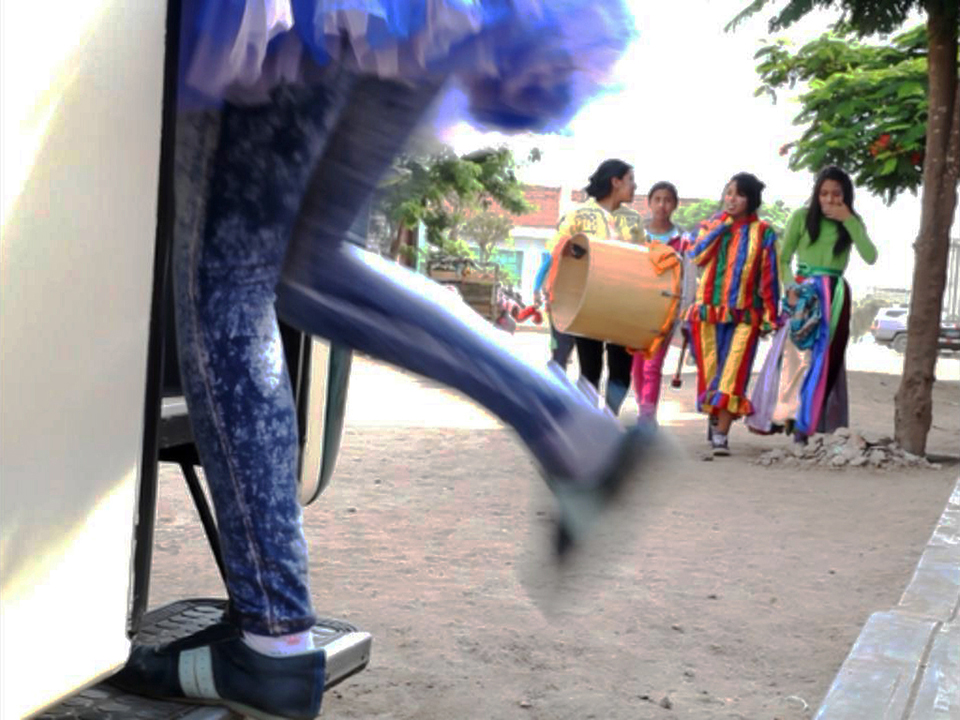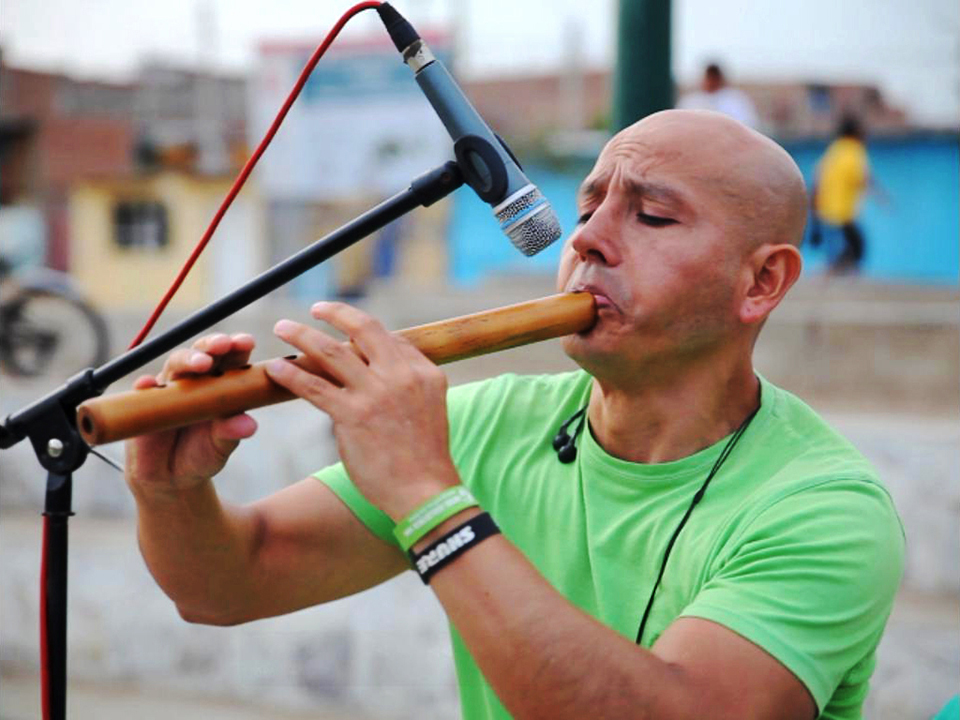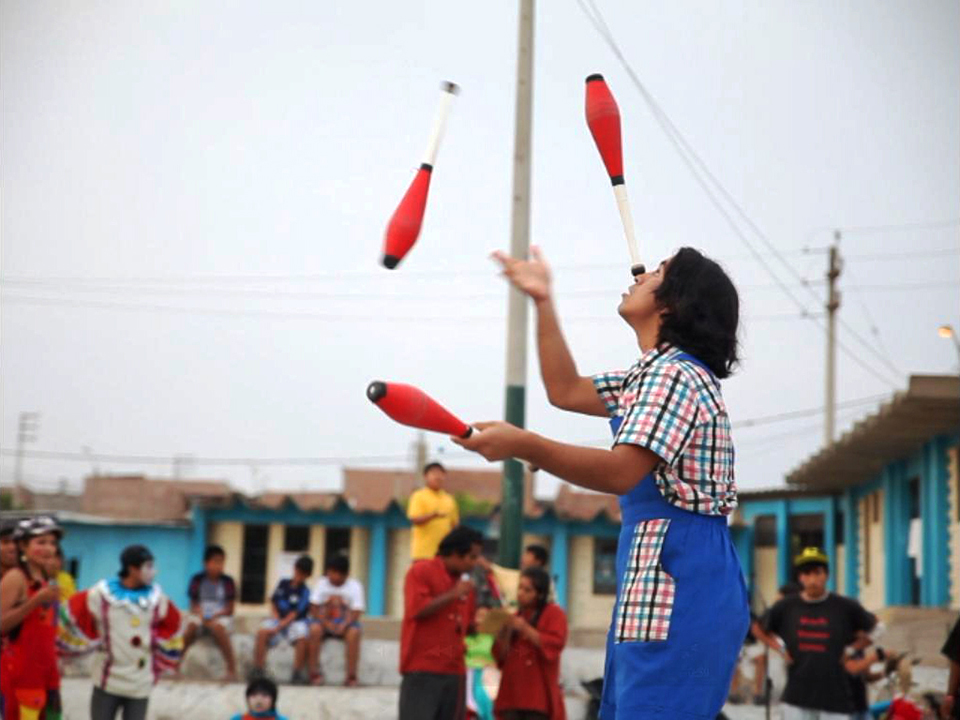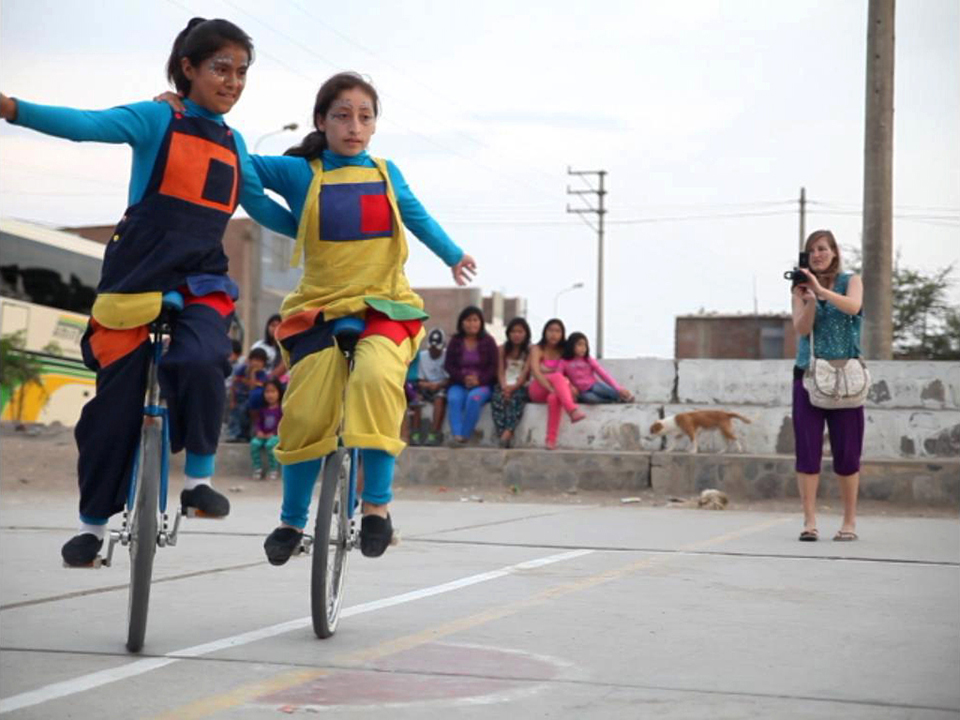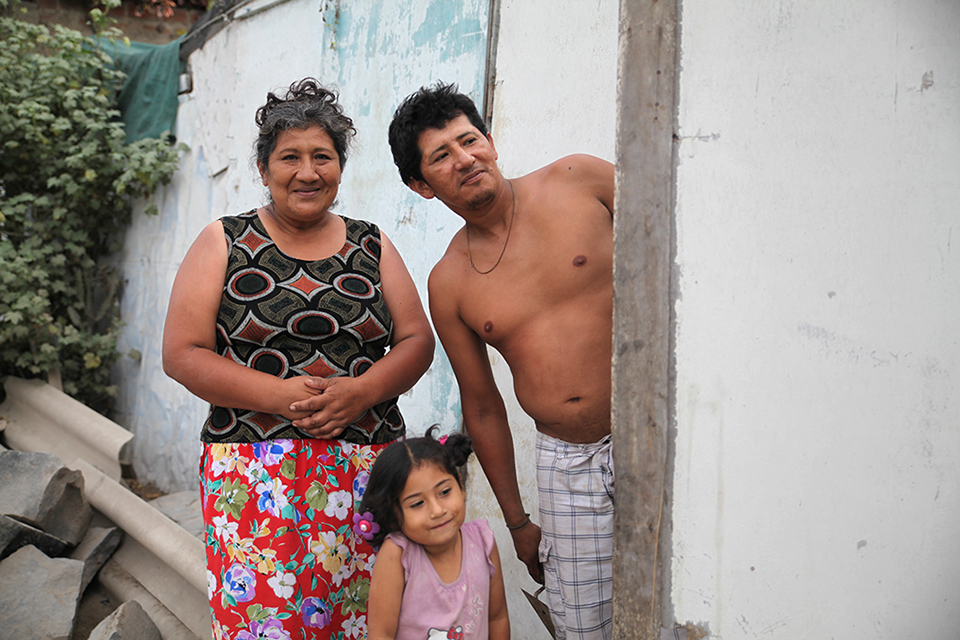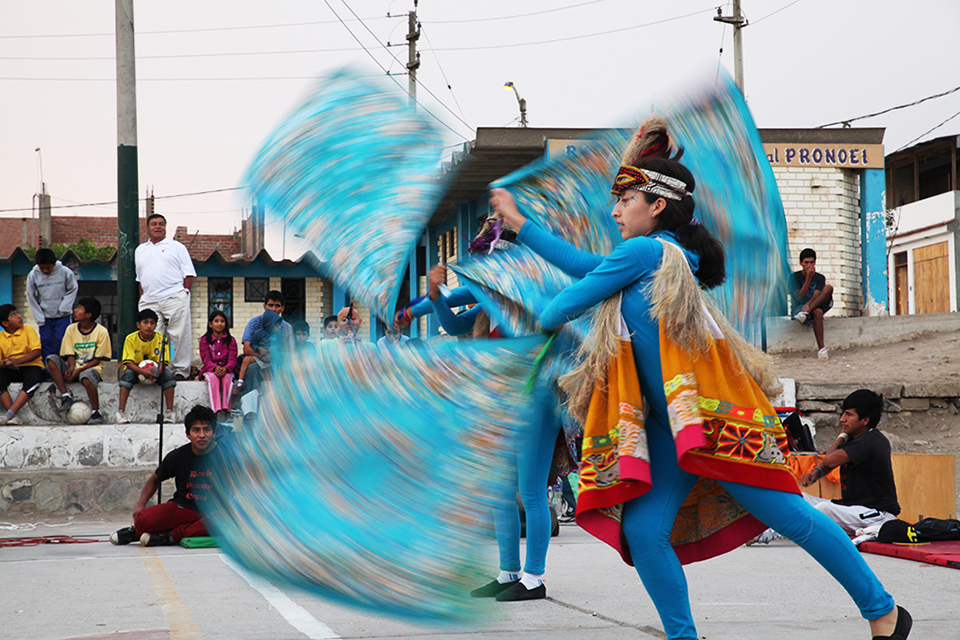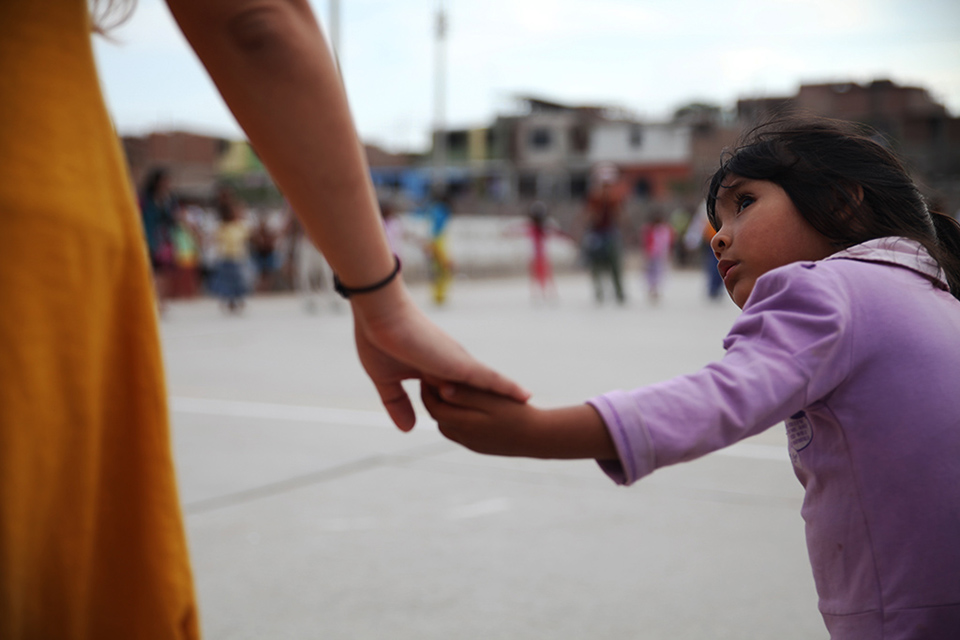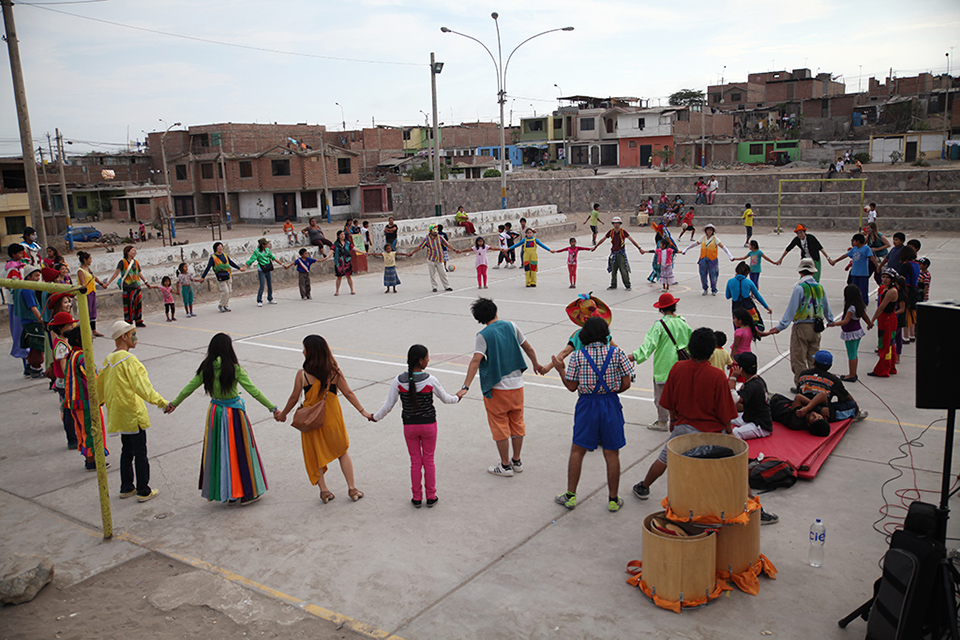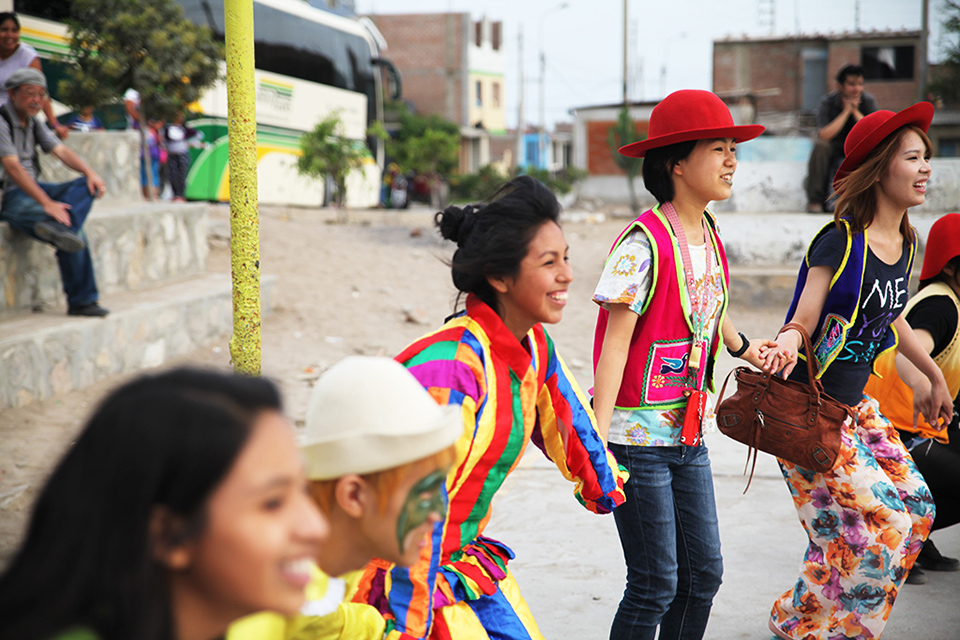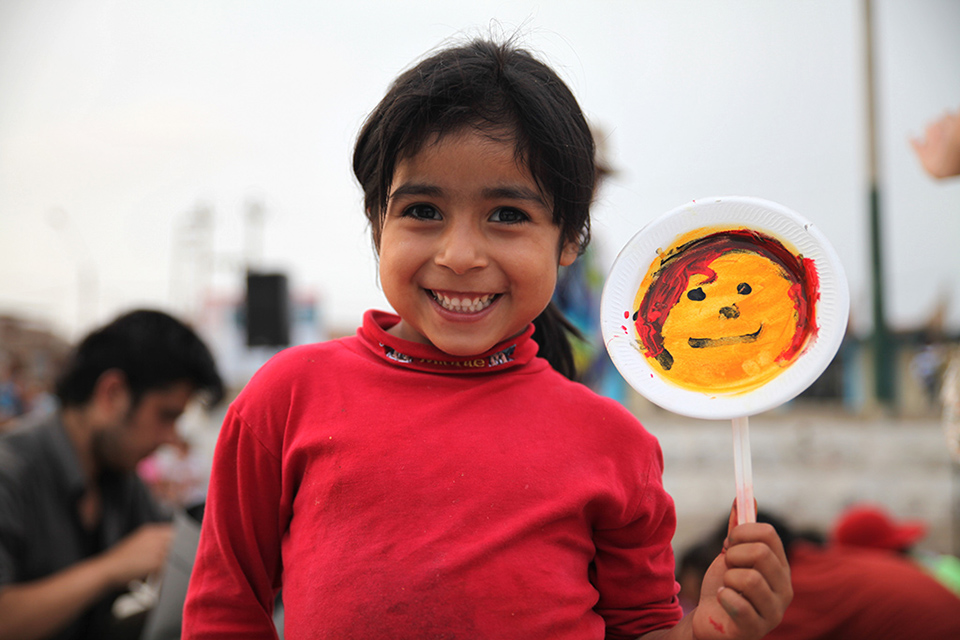An afternoon’s silence envelops Villa El Salvador, a city in the desert outside of Lima. A dog tiredly crosses the street. Suddenly he stops and pricks its ears. Was that a drum roll? And is that really a clown’s hat appearing behind the hill? Like a Fata Morgana, a group in colourful costumes approaches. Their stilts raise the desert sand and their drums accelerate the pulse of the neighbourhood. Some are virtuous performers, others struggle with their balance. Children peek out of front doors and join the caravan, their laughter fills the air. Villa El Salvador has changed in a heartbeat, the city is herself again.
The young musicians and acrobats are part of the theatre group “Arena y Esteras” and this particular afternoon they are joined by Peace Boat participants who visit the partner organisation during a two-days exchange tour. The group has been widely acknowledged for spreading hope and new visions to their once desperate community. In 2012 their founder Ana Sofía Pineda has received the most important cultural prize in Peru, the Premio Nacional de Cultura. The name “Arena y Esteras” pays tribute to the origins of Villa El Salvador, a settlement that started from scratch in the 70s by indigenous people, who had fled a guerilla war in the Andean mountains. When building their houses, they had nothing but sand (“arena”) for the ground and straw mats (“esteras”) for the walls. But despite the hardships Ana Sofía Pineda smiles when she thinks back. “It was a wonderful time.” Her mother, a daughter of Japanese immigrants, brought her to Villa El Salvador on the back of a lorry. She was poor, a single parent and three of her eight children had died early. “We had lived in many different places already, even in a factory building, depending on where my mother found work”, Ana Sofia Pineda remembers. But from all the places she had known, Villa was different. “There was nothing to be afraid of, not even cars.” She remembers running barefoot on the sand, day and night, alongside dogs and neighbour kids. Whereas the adults struggled for water, electricity and transport in the Pacific desert, the children perceived the same place as an endless beach.
Today an estimated 400.000 people live in Villa El Salvador. During their tour of the town, Peace Boat participants were stunned to see its rigorous urban planning. Early on, inhabitants had subdivided their city into 16 quarters (“manzanas”), which again were divided into self-governed residential groups. Certain areas are reserved for agriculture and fishery, beaches and industries. No less than 1200 Villa-based enterprises sell furniture and handicrafts all over the country. “It’s people’s solidarity that makes this place unique” Pineda reflects. “We realized that we couldn’t expect a lot from our government, hence we shared the little we had.” Right from the start, inhabitants within each residential group established strong bonds with each other by electing their own leaders, taking turns for cooking, sharing food and constructing communal spaces during community events called “minga” or “faena”. While neighbouring desert cities struggle with unemployment and violence, Villa El Salvador does relatively fine. The former settlement of the desperate and the displaced has become a model city praised for its self-administration and solidarity. Among many prizes it was awarded the title “Peace Ambassador” by the United Nations.
The inhabitants know what peace means, since their city had a narrow escape from being wiped out in a war. Ana Sofía Pineda vividly remembers one night in the early nineties, where Villa El Salvador went completely dark. “I knew that somebody must have manipulated the street lights. Suddenly fires lightened up on the beach and in the mountains. Once I got used to the sight, I recognized that each fire had the shape of the communist symbol ‘hammer and sickle’. I understood what that meant: ‘Sendero is watching you.'” Although the teenager didn’t know what Sendero Luminoso really stood for – few people did at that time -, she felt how something was strangling her city. Something bigger than poverty, water scarcity or housing rights – all these issues her mother and neighbours had fought for in the early years. No, this was something monstrous, something that wouldn’t go away through a few meetings or demonstrations. Her intuition was right: By that time the revolutionaries-turned-terrorists had already killed 70.000 people in the Andean mountains. They were struggling for power, no matter the cost. For them Villa El Salvador was the last hurdle to take before Lima.
Before long, the autonomous city had slipped into chaos, mistrust and desolation. Hundreds of local leaders were killed. Children got so used to the war that they started playing “terrorists and military”. Ana Sofía Pineda was a “rebellious teenager” at that time, as she says: “The more difficult everything became, the more I was striving for my freedom.” In the midst of explosions, arrests and shootings, when everybody hid inside, the 14-year-old and her friends went to the street. Not with slogans and a megaphone but with clown noses and stilts, staging a non-violent revolution. “I caused my mother many sleepless nights” she admits. “We were totally imprudent.” Ana’s friend Arturo Mejía, whom she later married, was put in prison for several days, but apart from that the young people were unharmed. “How could we silently give in to the destruction of all our parents had fought for? It saddened us to see that even neighbours had stopped talking with each other.” The young artists found another way to communicate with them – their circus performance touched everybody’s imagination and broke the spell. When the terrorists killed the admired vice-mayor of Villa El Salvador María Elena Moyano in 1992, anger and grief finally drove the whole city to the street. Hundreds of thousands of people joined her coffin to the grave.
Within the last two decades terrorism and political tensions in the region have decreased. A new train line has shortened the distance between Villa and Lima from 90 to 20 minutes, making the settlement less of a shanty town and more of a capital’s suburb. However, the community sees new threats: The consumer society has visibly taken hold of the once autonomous settlement, houses are sold, ground is privatised, corruption rampant and families fall apart. More than ever, Ana Sofía Pineda is destined to preserve the city’s original values – and the last 20 years have prepared her for this task: She has studied in France and has become an experienced educator and cultural promoter. Arena y Esteras has grown into a widely acknowledged organisation and theatre school with hundreds of young participants, which attracts international sponsors, awards and is regularly invited abroad.
When Peace Boat participants stayed overnight in the organisation’s new building, the “Casa Cultural Comunitario”, sponsored by the Japanese Embassy in Peru, they easily became part of the Arena y Esteras family, sharing food and knowledge. Despite the language barrier, they made friends with the Peruvian teenagers: With Dayan who painted their faces, with Yann who held their stilts while they walked and with Flor, who danced with them on stage. Flor is fourteen – the age Ana Sofia was, when Sendero invaded the city. The schoolgirl joined the free theatre courses three years ago and has already become a talented drummer, trapeze artist and speaker. Together with six friends she is preparing to go on her second tour to Europe with the “Moo” this summer, a play they have written themselves. With songs, dances and artistic elements they tell the story of Peruvian children who disappear as a consequence of family violence, inhumane working conditions or the anonymity of the big city. “Nearly all of us have experienced violence or other problems in our families” shares Yann, a shy 20-year-old, who joined Arena y Esteras against the will of his extended family. “My uncles and cousins criticized me and suggested that I should look for a job instead.” When he quit university, because he couldn’t cope with the expectations, Arena y Esteras became his school of life. Sometimes Ana Sofía Pineda wakes up in the middle of the night, when one of her students knocks on the door in search of an advice, a place to sleep or simply a hug. They get all of this. For many, the Casa Cultural has become a second or a first home.
“We do not focus on training professional acrobats” Ana Sofía Pineda tells Peace Boat participants. “Our main goal is to form community leaders of tomorrow.” Flor plans to study communication in Lima one day, but she wants to use her skills for the benefit of her people. “Our travels abroad inspired me a lot. But it frustrated me to see rich people who use their resources for complete nonsense and still complain about their lives” she says. “Here I have learnt to appreciate my origins and my family.” The drums are calling, she smiles apologetically and walks towards the coulisse, where her friends are waiting. Unlike 1991, 2013 is a good year to be a teenager in Villa El Salvador.
